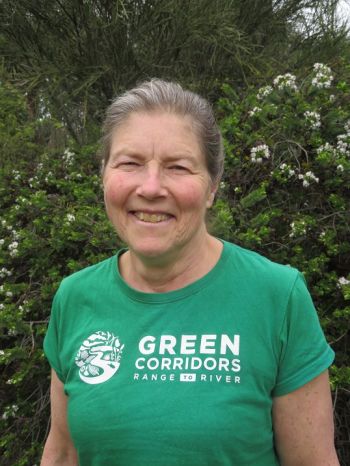Rosemary Gear has always been involved with the environment, and after migrating with her family from South Africa to New Zealand in 1988, she has not shown any signs of slowing down. She planted their new property of 1.5 hectares in purely native plants and six years ago joined the volunteers of Green Corridors. Working with others her passion for the environment is contributing to an inspiring change in the region.
“Green Corridors was started in 2001 by two community members, David Forrest and Eddie Welsh, who had a vision of planting eco-sourced native plants along the Turitea Stream. The idea was to enable birds, geckos, insects to have a safe corridor to encourage them to move from the Tararua Range to the Manawatū, and on into town. These plantings also improve the water quality of the stream and enable the aquatic life to thrive."
Rosemary considers Green Corridors a successful model to promote the biodiversity of the region, working in partnership with the Council to create healthy and beautiful plantings. Green Corridors is supported by the Council, various companies and groups. "When I came on board we were supposed to plant up to 10,000 plants a year. Now it is 15,000 plants, and we are trying to go up to 20,000 plants."
Speaking on the importance of Green Corridors’ work, the group has not only planted along the Turitea Stream but has extended their plantings to many of the gullies in the Summerhill/ Aokautere area. Rosemary says “ Two years ago a monthly working bee was started in Adderstone Reserve to tackle the maintenance of the plantings. A year ago a second regular working bee was started in Upper Pari and it is hoped more volunteer groups will form for other gullies. Each working group has a cohort of approximately 11 volunteers who meet and target blackberry, ivy, Old Man’s Beard and other weeds that are compromising the health of the native plantings. The work these volunteers have done in the two Reserves to date is mind-blowing. “
Rosemary says additional funds for maintenance is an enormous challenge. "Funding is probably our principal problem as the focus on planting is just not sustainable. We need a significant amount of the funding allocated to maintenance. Everyone wants to plant, but we are increasingly concerned about maintenance. Failure to keep the weeds in check will result in many of our plantings being lost. We are addressing this issue but relying on volunteers to do much of this work is challenging. We have to look after our plants and make sure they thrive."
Green Corridors has an ambitious goal of using GPS for mapping food trees, recording the date of planting and measuring their growth each year and the date of their first fruiting. "We are hoping to set this up to continue for many, many years, long after we have gone. It will also enable us to check on their health."
She firmly believes that nature is hugely therapeutic "It is essential for our mental health, for everybody's mental health to be able to get out into an area where they can walk, run and cycle without it costing them anything and to get away from their everyday worries."
Connecting children with nature is an excellent way to make sure that the next generation values our environment and the need to protect it. "Educating children to appreciate how incredibly lucky we are in New Zealand to have such wonderful plants and fauna is vital. We need to protect and improve our biodiversity."

